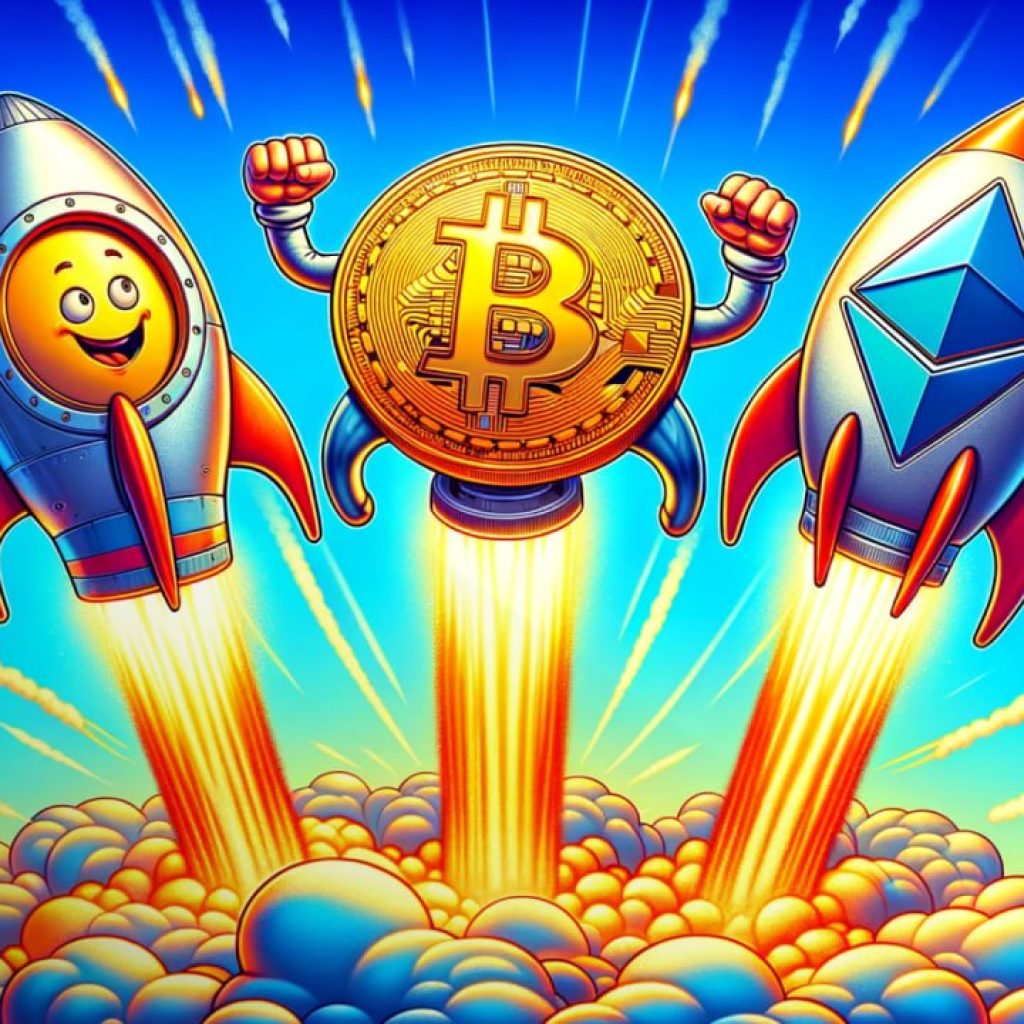Ethereum’s ecosystem of decentralized applications hogged the headlines for years, but with the rise of next-generation Layer-2 networks on Bitcoin, it has become clear that BTC isn’t just for “hodling” anymore. As a result, it’s the Bitcoin-based dApps that are among some of the hottest properties in crypto today.
Bitcoin L2s like Stacks, Merlin Chain and Dovi are game-changing innovations that bring speedy transactions, smart contracts and much more to the world’s original blockchain, paving the way for Bitcoin-based DeFi, NFTs, blockchain games and more.
By expanding Bitcoin into these ecosystems, BTC itself gains a lot more utility than ever before. No longer is it just a “store of value” and a means of paying for stuff online. Instead, you can actually put your BTC to use, such as by staking it to secure other blockchains, using it as collateral in decentralized lending protocols, yield farming and more, earning interest in BTC itself.
This additional utility promises to revolutionize Bitcoin and shake up the crypto industry in a way that’s never been seen before, increasing its adoption. After all, we’re talking about over $1.7 trillion worth of BTC, which has always been sitting idle in people’s wallets, suddenly being made much more useful.
So let’s take a look at some of the top dApps are helping to boost Bitcoin’s adoption:
1. Solv Protocol
Solv Protocol is a platform that’s designed to help BTC holders put their assets to work and earn yield via its Decentralized Bitcoin Reserve, primarily by simplifying the process of staking Bitcoin.
Traditional Bitcoin staking has always been a headache, with a high barrier to entry that involves multiple steps, interacting with different protocols and cross-chain transactions, made worse by a lack of sufficient liquidity. These problems discourage BTC staking for all but the most determined users. Solv ‘solves’ these problems with its novel Staking Abstraction Layer, which is a clever system that aims to abstract the above complexities away. It standardizes and automates those processes, making it simple to stake BTC with just a couple of clicks. Solv acts much like a blockchain bridge, coordinating different aspects of the staking system, such as validators, distributors, yield and liquid staking tokens, to ensure everything works smoothly.
When users stake BTC, they’ll receive SolvBTC tokens that represent their stake while their original deposit is locked up. These assets can then be moved across different networks, such as Ethereum, Solana and BSC, giving users additional options to earn yield via liquidity pools with minimal friction.
In addition, Solv works with protocols like Chainlink to streamline cross-chain transactions, avoiding delays and high fees. Putting it all together, it gives BTC holders an easy way to earn interest on their BTC and explore various other DeFi protocols with their SolvBTC tokens, which can easily be used to take part in multiple yield-earning opportunities.
2. Zest Protocol
As the very first Bitcoin-native lending protocol, Zest Protocol provides a way for users to put their BTC to work in a different way, using it as collateral to obtain crypto loans. The protocol uses the same kinds of smart contracts employed by lending and borrowing dApps on Ethereum, but it taps into a much larger potential market.
Users can deposit their BTC and obtain a loan in various other types of cryptocurrencies, such as ETH, stablecoins and more. Alternatively, they can put their BTC into one of Zest’s liquidity pools, providing capital for others to borrow, earning a part of the interest on those user’s repayments.
The biggest advantage of Zest is it gives BTC holders a way to start earning interest through a single, very simple transaction. You simply send the funds to the appropriate liquidity pool’s address and you’ll start earning additional BTC. As one of the original pioneers of DeFi in the BItcoin ecosystem, Zest is creating a new era of financial opportunity for BTC holders, who can continue to leverage the unparalleled security of the Bitcoin blockchain.
3. Alex
For more comprehensive Bitcoin DeFi options, look no further than Alex, which is building a DeFi protocol for BTC and other BRC-20 tokens. It’s betting on the utility demands of next-gen Bitcoin users, and it’s doing this by abstracting away the complexity of Bitcoin’s L2s to simplify access to this new world of financial opportunities.
Alex is deeply integrated with the Bitcoin L2 Stacks, and it has five key components to it platform, including its Orderbook-based decentralized exchange platform that enables users to swap BTC and STX tokens for various BRC-20 assets, as well as other tokens. Its features include an off-chain order matching engine and gas-free transactions. It also supports various yield farming protocols for those seeking to earn interest on their BTC and BRC-20 coins.
In addition, Alex has created a Bitcoin oracle that links the original Bitcoin blockchain to off-world data, supporting the growth of more versatile Bitcoin dApps with real-time price indices of tokens from other blockchains. There’s also a Bitcoin bridge, which enables BTC and BRC-20 assets to be swapped for Ethereum and ERC-20 tokens and utilize smart contracts. Meanwhile, Alex’s cross-chain bridge enables assets like ETH and USDT to be minted on Stacks as sETH and sUSDT, so they can be used in Bitcoin-based DeFi.
Finally, Alex has created its very own launchpad for the BRC-20 ecosystem to assist verified Bitcoin projects in their growth.
4. Ordinal Punks
One of the hottest areas of growth in the Bitcoin ecosystem is NFTs, and one of the most famous collections of all is the Ordinal Punks. Bitcoin NFTs are different to those found on Ethereum, as each asset is basically an Ordinal, inscribed onto a single Satoshi, the smallest unit of a Bitcoin, but they’re far more valuable than your average Satoshi.
By far and away the most exclusive of all Bitcoin-based collectibles is the Ordinal Punks NFT collection, which is limited to just 100 NFTs. It was the first major NFT collection on Bitcoin, inspired by the legendary CryptoPunks NFTs on Ethereum. Its historical significance and limited supply makes it one of the most coveted of all Bitcoin digital collectibles.
The floor price of an Ordinal Punk is currently 1.3 BTC, or over $90,000 at the time of writing. At present there are just 76 individual owners of Ordinal Punks, who gain access to an exclusive community and potential future benefits such as airdrops.
5. Taproot Assets
Taproot Assets is a Bitcoin layer that’s focused on asset issuance, providing an easy way for anyone to create and issue assets such as stablecoins, security tokens and NFTs on the Bitcoin blockchain.
Once the user creates their asset, it can then be transferred to the Lightning Network, where they can take advantage of its low-cost, high-throughput network with near instant transaction settlement.
Creating an asset on Taproot involved embedding metadata within an existing Bitcoin Unspent Transaction Output or UTXO, which refers to the coins that remain in a Bitcoin wallet after a transaction has been executed.
The Taproot Assets protocol makes this normally very complicated process simple and efficient for users, and it’s possible to create and transfer multiple assets – such as an entire NFT collection, using a single UTXO. The protocol stores the asset metadata off-chain to minimize each asset’s footprint on the Bitcoin blockchain.
A key aspect of the protocol is the Taproot Assets Universe, which is an extensive database that contains information about all of the Taproot Assets and their proofs, rules and transaction histories. It’s somewhat similar to a traditional Bitcoin explorer, and makes it possible to view the verified owners of each asset minted via Taproot.
Growing Utility To Accelerate BTC Adoption
As Bitcoin continues to evolve and expand its utility, more people are becoming curious about the growing possibilities that exist to put their BTC to use. The Bitcoin ecosystem is still very immature compared to what’s available on blockchains like Ethereum, but the above applications illustrate the great strides that have already been made.
In a nutshell, BTC is a very different beast compared to the idle asset it was just a couple of years ago. With the emergence of Bitcoin L2 networks and concepts like Ordinals and Runes, it’s becoming possible to do much more with BTC.
Although Bitcoin is already the world’s most popular and valuable digital asset, the ability to do more than just sit and “hodl” promises to drive another huge wave of adoption.
Disclaimer: This article is provided for informational purposes only. It is not offered or intended to be used as legal, tax, investment, financial, or other advice.





